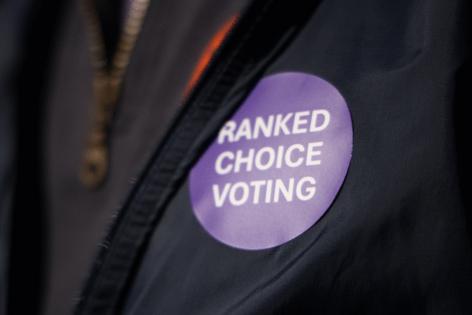Commentary: Election reform turns down the temperature of our politics
Published in Political News
Politics isn’t working for most Americans. Our government can’t keep the lights on. The cost of living continues to rise. Our nation is reeling from recent acts of political violence.
79% of voters say the U.S. is in a political crisis, and 64% say our political system is too divided to solve the nation’s problems.
There’s no silver bullet that will simply put us back on the path of a productive, representative democracy – but what if part of the solution lies in how we elect our leaders?
Reforming our elections can give voters more choice, lower the temperature of our politics, and give lawmakers incentives to work together for all of us. Specifically, ranked choice voting and proportional representation would make politicians reach across the aisle and deliver for their constituents in order to win and keep their seats.
With ranked choice voting, voters can rank candidates in order of preference: first, second, third, and so on. If your first choice doesn’t have a chance to win, your ballot counts for your next choice.
This simple change moves elections away from today’s “us vs. them” mud-slinging, and instead rewards candidates who run positive, issue-based campaigns that appeal to more voters.
That’s because candidates need to earn a majority of voter support to win an RCV election – giving them reason to talk to voters outside their base. Candidates also have incentives to find common ground with their opponents – since they may need to earn second- or third-choice support from voters ranking their opponent first.
How does this work in practice? In New York City’s RCV primary this summer, mayoral candidate Zohran Mamdani “cross-endorsed” with rival Brad Lander – meaning Mamdani and Lander encouraged voters to rank them both. The pair released joint ads, held joint campaign events, and made TV appearances together. In Alaska, Republican Senator Lisa Murkowski and Democratic Congresswoman Mary Peltola endorsed each other.
As conservative political theorist Yuval Levin recently shared, “The skill you need to win in a ranked choice election…. That’s the kind of personality you want in politics.”
The collaboration and coalition-building of RCV reverberate beyond Election Day. Following the latest RCV elections in Alaska, bipartisan majority coalitions formed in both houses of the state legislature – with Republicans, Democrats, and Independents working together to deliver practical solutions on education, public safety, business opportunities, and a balanced budget.
Proportional representation could have an even greater impact. Already used in most democracies around the world, proportional representation is just what it sounds like.
Instead of having just one representative, a district elects several members in line with their share of the vote. For example, if about 60% of votes go to conservatives and 40% go to liberals, then about 60% of seats go to conservatives and 40% to liberals. In a five-member district, conservatives would win three seats and liberals two.
Compare that to our current elections, where one group of voters elects its favorite candidate and everyone else gets nothing. Rural Democrats and urban Republicans might make up 40% of the population in their districts. They should have a voice, but their preferred candidates are nearly always defeated.
This lack of representation fuels polarization and everyday Americans’ frustration with our political system.
When most districts are “safe” for one party, elected officials win by appealing to smaller, more partisan primary electorates. They have little incentive to engage with anyone outside their party base. Meanwhile, voters who live in a safe district feel like their vote doesn’t really matter – especially if their district is safe for the party they oppose.
If Congress were elected with proportional representation, every district would become a swing district. All our votes would matter, and our voices would be heard. There would be Democrats, Republicans, and perhaps even independents representing each district. Leaders from different parties would have new incentives to work together to deliver for voters.
This moment is perilous for our democracy, but it is also time for change. Voters across the political spectrum have been growing more frustrated with our divisive politics for decades. Simply changing the party in power has not worked; now is the time for ambitious, structural reforms that empower voters and improve governance.
Ranked choice voting and proportional representation would put voters back in the driver’s seat and encourage lawmakers to reach across the aisle to get things done. They offer a path away from America’s poisoned politics and toward a productive democracy that is again working in the public’s interest.
____
Meredith Sumpter is the president and CEO of FairVote, a nonpartisan organization seeking better elections.
_____
©2025 The Fulcrum. Visit at thefulcrum.us. Distributed by Tribune Content Agency, LLC.
























































Comments